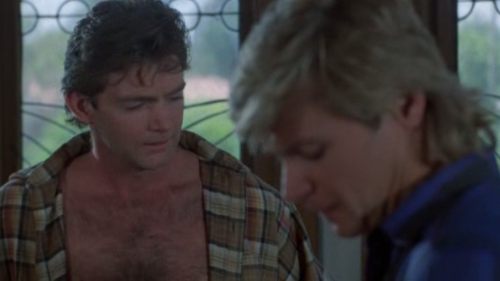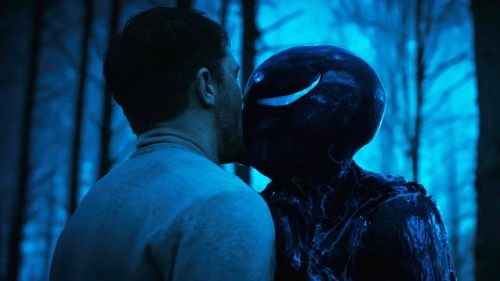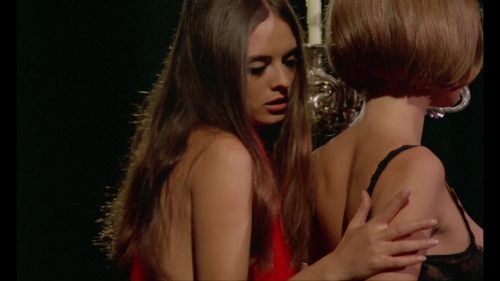Queer Underworld: HELLO MARY LOU: PROM NIGHT II (1987)
It’s a common adage that, in fiction, the monster is never just a monster. Horror, science fiction, and fantasy are the venues through which we explore ideas through metaphor and allegory, sometimes unintentionally through the lens of an audience who connects with a work’s themes in a manner specific to them. Such is the case with all manner of LGBTQ cinema, which has often relied on metaphor to smuggle queer themes into cinemas or been subject to queer interpretations after the fact. We at Birth.Movies.Death want to give those queer readings of genre films a voice. This is Queer Underworld.
Feminism and sexual liberation go hand in hand, particularly as it concerns young women’s sexual autonomy, regardless of who that sex is with or for what purpose the woman is choosing to have sex. It’s a shared concern between cisgender straight feminists and queer folks, as both overlapping camps have an implicit interest in personal freedom from monolithic patriarchal sexual norms, but in the grand ol’ era of the Reagan presidency, when so-called family values were the pop-cultural talking points that attempted to roll back the sexual revolution of the previous generation, such depictions of sex and sexuality were swept from mainstream public focus. Of course, it’s no secret that this is where genre cinema enters the picture, using the supernatural as a vessel to communicate ideas that could not be bluntly stated but didn’t need to be to carry through. Enter Hello Mary Lou: Prom Night II, a 1987 pseudo-sequel to Prom Night that really only borrows the title for branding purposes, which introduced the world to one of the great feminist horror villains.
The film opens in 1957, part of a decade that 80s pop culture loved to romanticize and fetishize, with Mary Lou confessing to a priest that she disobeyed her parents, used the Lord’s name in vain, and had sex with various boys… and she also loved every minute of it. Mary Lou is the antithesis to the archetypal model of feminine decency, but interestingly this doesn’t prevent her from winning the title of prom queen. But when you stop and think about her sins, there isn’t much of a reason why she shouldn’t wear the crown. The only behavior she exhibits at this point that is actually harmful to anyone is how she cheats on her boyfriend Billy with Buddy Cooper, and there isn’t much evidence to suggest that anyone but Billy considered their relationship very serious. At the very least, Mary Lou doesn’t deserve what comes next for her, as Billy’s attempt to sabotage her win with a stink bomb ends up lighting her dress on fire and killing her.
Flash forward to the film’s present day of 1987 and we meet our protagonist, Vicki, daughter of strict Catholic parents and with no apparent designs on disobedience or sexual exploration. When Vicki’s mother denies her a new prom dress, though, she’s left only to search the school’s prop room for potential costumes and stumbles upon an old truck holding the prom queen accouterment from the year Mary Lou was killed. Of course, this being a horror movie, those items are possessed by the spirit of Mary Lou, who wants nothing more than to claim her crown as prom queen through Vicki and live the so-called sinful life she was denied.
In essence, this is a good-girl-gone-bad story, framing Mary Lou’s possession of Vicki as something akin to a sexual awakening. Before Mary Lou takes complete control of Vicki’s body, Vicki starts snapping at her friends in adolescently angry, seemingly hormonal outbursts, and she starts experiencing hallucinations that frame her normal everyday existence as perverse and distorted. Vicki’s friend Jess’s apparent suicide is represented through a lunchroom of the damned, where Jess (and by extension her tragedy) are consumed by the student body for grotesque sustenance. Vicki’s childhood bedroom becomes predominated by monstrous perversions of her rocking horse and various infantilizing artifacts. The innocent normalcy of Vicki's conservative suburbanite upbringing is taking on sinister dimensions, and as her worldview shifts to further reflect Mary Lou’s hellish return, she also starts to share Mary Lou’s lusts for power and sex.
This is where the monster of this monster movie comes into focus, as a fully possessed Vicki seduces and kills her way to the top of the prom queen food chain, but when you think of things from Mary Lou’s perspective, she has a right to be pissed off. After all, she died for the simple privilege of practicing sexual autonomy, and those she kills are people who either stand in her way to her one goal toward happiness or are hypocritically getting away with the sins she died for. Jess was killed by Mary Lou’s possessed cape for daring to modify the prom tiara, but she also represents the sexual freedom characterized by her unwanted pregnancy, which most people assume is the impolite reason for her supposed suicide. Vicki’s friend Monica is killed via a very satisfying telekinetic crushing while hiding from Vicki in a locker, but the scene that immediately precipitates that is Monica fleeing Vicki after a sexual advance, confirming Mary Lou’s bisexuality and Mary Lou’s willingness to kill in order to divert suspicion of that orientation when Monica reacts negatively to the seduction. Mary Lou throws her mother out a window simply for standing in her way to go to prom, albeit after seducing Vicki’s father in a further, albeit more problematic, subversion of sexual norms. Mary Lou kills Josh, the computer geek tallying the electronic prom votes, after he rigs the election in exchange for sexual favors from Vicki’s rival Kelly. Interestingly, Mary Lou murders Josh for this, but not Kelly, in a seeming reversal of the double standard by which she was judged for her desire to live lasciviously.
What really hammers home the themes of fighting sexual repression, though, are the primary forces who stand in Mary Lou’s way to achieving prom queenhood, or metaphorically, Vicki’s embrace of her own sexuality. Billy and Buddy Cooper, Mary Lou’s prom night lovers, have since grown into the school principal and the priest, respectively, two patriarchal pillars of the idealized American community. Father Cooper comes to encounter the possessed Vicki first in a scene that mirrors the film’s prologue, and it’s here we see the ultimate refutation that Mary Lou is justified in her rage. She tells Father Cooper that there is no heaven, that she got “no fucking wings,” therefore meaning all her community's moralistic puritanism was for nothing. This is why Christian talismans such as crucifixes have no effect on her; the film is implicitly telling us that it’s all bullshit and that Mary Lou really did die for nothing.
But it’s Billy’s attempts to stop Mary Lou that are most telling of the film’s subversive use of its monster. In a scene that mirrors Billy’s initial fatal revenge, he shoots Vicki from the rafters, but instead of killing Mary Lou it only unleashes her fury on the prom. The film concludes with Billy apparently calming Mary Lou’s spirit by giving her the cape and tiara she never got to wear in life, thus freeing Vicki and his son Craig to have a life together free of Mary Lou’s influence. Except, as the film closes out, it appears that Mary Lou has actually possessed Billy, who traps the screaming teens in a car for a wild ride to destinations unknown. Mary Lou’s ultimate revenge is to take control of her ex-boyfriend and the school principal, the very symbols of patriarchal power that sought to contain her, and the film closes out on the idea that the social strictures that killed Mary Lou might fall apart under new management.
Now, admittedly, some of this is reading into a film that frames the queer-coded sexual liberator, obsessed with camp pageantry and consequence-free lust, as the villain of the piece, and if you are a member of the white straight American middle class that her actions critique, then yes, there is a level of unironic appreciation of her as a force for evil. However, so much of queer and feminist iconography in popular culture is rooted in villainy for this specific reason. Queer coding villains has long been a stock standard shorthand for villainy, particularly in the 1980s, so those of us who identify with queer and feminist villains are also likely to see the point in their actions, to empathize with their struggles because it’s easy to see those struggles as linked to their queerness and hence our own. However, I’m not entirely convinced Hello Mary Lou is a form of accidental feminism. I rather think it’s a demonstration of how villains can be used to deliver subversive messaging to an audience willing to look outside the mainstream, and it's a testament to how a queer feminist villain can speak to people that society deems as inherently villainous, even as the film she occupies nominally appeals to straight conservative values.
If you have suggestions for genre films that deserve a queer examination, lay them out in the comments below or tweet at @LeighMonsonPBF.



